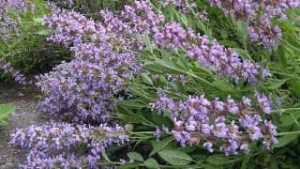Benefits of Sage Tea - 8 Indications

Salvia officinalis (sage) is not only a plant that decorates the garden, it is also used for culinary, medicinal and cosmetic purposes.
What are its virtues and its medicinal properties ? What are the contraindications of sage ?
The main therapeutic and cosmetic benefits of sage will be discussed below.
Benefits of Sage – 8 Therapeutic and Cosmetic Indications
1) Menopause and Premenstrual Disorders
Clinical studies on the benefits of sage for treating disorders associated with menopause and premenstrual symptoms are rare.
An Italian study conducted at the University of Siena (Università degli Studi di Siena) and published in May 1998 assessed the estrogenic-like effects of sage on the conventional symptoms of menopause.
Out of 30 postmenopausal women, 20 were freed from hot flushes and excessive perspiration, 6 found a significant improvement in symptoms while, 4 benefited less from the medicinal properties of sage. However, the levels of female hormones in the blood such as estrogen, follicle stimulating hormone (FSH) and luteinizing hormone (LH) remained unchanged.
2) HYPERHIDROSIS (excessive sweating)
Salvia officinalis reduces the secretion of sweat in the following cases: axillary hyperhidrosis, night sweats, sweaty feet, nervousness, Graves’ disease, neurasthenia, tuberculosis, obesity and menopause.
Several clinical studies have confirmed the benefits of sage tea in sustainably reducing perspiration and preventing bacterial growth.
An infusion of sage (sage tea) taken orally has astringent, antibacterial and antifungal properties that prevent excessive sweating.
There are also commercial products based on sage extract for local application to the armpits.
3) Memory and Alzheimer’s Disease
The Medicinal Plant Research Centre (MPRC) of England recently conducted a study to assess the benefits of sage on memory. Participants underwent cognitive tests, including tests to determine attention, memory and visual cognition.
The sage extract used in this study to improve memory and mental functions of young healthy adults.
What sufferers of Alzheimer’s disease patients ? Some active principles contained in the sage inhibit or neutralize an enzyme called « acetylcholinesterase »(AChE), which breaks down acetylcholine, a neurotransmitter that transmits information from one neuron to another. So Alzheimer is accompanied by a reduction of acetylcholine.
Sage is therefore a natural remedy to improve cognitive functions in sufferers of mild to moderate cases of Alzheimer’s disease (Bulk Sage Leaves for Infusion).
4) Oral Care
Since long ago, sage leaves with antiseptic were used in the Native American tribes to serve as cleaner and bleach teeth.
The oils and tannins contained in sage have astringent and antiseptic properties that are used to treat sore throats, pharyngitis, tonsillitis, stomatitis (inflammation of the oral mucosa)(Sage mouthwash), gingivitis (inflammation of the gums) (Gingival sage gel), glossitis (inflammation of the tongue) or mouth sores.
The regular drinking sage tea or gargling of sage tea contributes to good oral hygiene.
5) Hair Care
Sage is used in cosmetics to darken brown or black hair and reduce gray hair. Clary sage-based products benefits the hair.
Sage Shampoo for tired hair leaves the hair soft, shiny and the scalp refreshed. Sage strengthens hair when their loss is related to hormonal imbalance.
6) Digestive Problems
By virtue of its choleretic properties , sage tea is used for the symptomatic treatment of digestive disorders such as epigastric distension, bloating, stomach spasms, slow digestion, belching or flatulence.
7) Relaxing
Sage essential oil is relaxing and is used in diffusion or mixed with a dispersing agent in the bath.
8) Intimate Hygiene
Another therapeutic benefit from the sage is to take care of the vaginal mucosa. The sage extract, an antiseptic agent and emollient, is a natural remedy that can gently cleanse sensitive intimate areas while respecting the natural pH level (between 5 and 5.5).
Salvia officinalis soothes and protects the skin against inflammation (Cleansing intimate soothing sage emulsion and Soft cleaning wipes based on a natural sage extract).
Warnings against Salvia Officinalis – Adverse Effects of Medicinal Sage
➤ Ingestion of sage infusion (sage tea) may interfere with the absorption of iron in the body.
➤ Self-medication with sage essential oil is not recommended due to its thujone content. Thujone is very convulsive and causes feelings of disinhibition. It is therefore appropriate to use sage essential oil with caution.
➤ Sage should not be taken by pregnant women, young children and people with epilepsy.
➤ Breastfeeding women should not drink sage tea if they intend to reduce milk production.
➤ At the recommended dosage, side effects of salvia officinalis are exceptional and may include the event of nausea and vomiting.
► Possible drug interactions with certain prescribed medications for anxiety, insomnia and psychological disorders (neuroleptics).
Want to Know More about the Characteristics of the Plant ?
To discover the medicinal properties of salvia officinalis and its active components, please click on this link:
➤ Properties of salvia officinalis – Sage Leaves and their medicinal virtues
Author : Alexis ROGER
Weight Loss Juice with Parsley
Brain Teaser
__________

